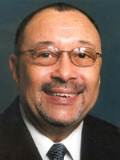 |
Professor Charles Hancock was a friend and a colleague who made
a difference in the lives of thousands of people. An internationally
known advocate for language teaching, he served as officer for a number
of professional associations, including president of the American
Council of the Teaching of Foreign Languages. During the period that he
was a professor of foreign and second language education (FSLED) in the
College of Education at the Ohio State University, he was the advisor to
more than 60 PhD students from countries around the world. Dr. Hancock
was himself a gifted teacher of French and Spanish and expanded the
number of teacher education credential programs to 11, including
languages such as Swahili and Arabic. As associate dean in the College
of Education and Human Development and director of the Young Scholars
Program, he was committed to increase educational opportunities to
communities that have historically been excluded from or
underrepresented in higher education. He believed like Dr. Martin Luther
King in the Beloved Community and his life exemplified “walking the
talk.”
As a teacher educator and trainer of trainers, he had a deep
and lasting impact on so many of us. As his colleagues and students, we
would pass on what we learned from him to our students. He was my
mentor, introducing me to the Zambian proverb “Start where you are, but
don’t stay there.” Over the years, I have repeated that saying countless
times. Even when we encounter the systemic nature and depth of
oppression and exploitation, we are encouraged by Dr. Hancock’s example
and his life. For those of us who are involved in critical social
analysis, this Zambian proverb has shown us that there is hope, despite
what we may see and feel. Social change does not proceed in a straight
line, but in zig-zags. It is not easy, given the magnitude of inhumanity
to work for social transformation. Dr. Hancock’s Zambian proverb is a
reminder to us as educators that oppression can be overcome, if we
continue to persevere and work for peace with justice. I will truly miss
his friendship, counsel, and intuitive insight and advice. His life
shows the difference one educator can make in the lives of so many
people.

Dr. Charles Hancock
(1940-2012), OSU
References
Charles R. Hancock: Obituary.
(2012, November 4). The Columbus Dispatch. Retrieved
from
http://www.legacy.com/obituaries/dispatch/obituary.aspx?pid=160790618#fbLoggedOut
Dr. Shelley Wong is an Associate Professor in the College of Education and Human Development (CEHD) and CISA Faculty Fellow with the Center for International Student Access at George Mason University, Fairfax, Virginia U.S.A.
|

